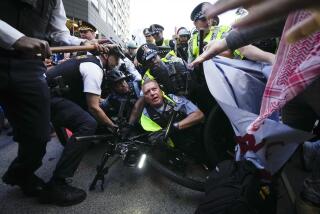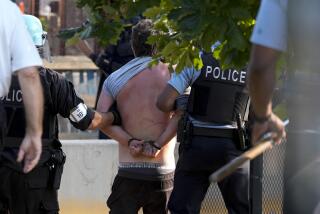Moscow Protest Broken Up by Security Forces
- Share via
MOSCOW — Police officers, aided by hundreds of burly men in civilian clothes, forcibly broke up a demonstration planned by Jewish refuseniks Sunday and roughed up and briefly detained American television newsman Peter Arnett.
About 80 refuseniks--Soviet citizens who have been denied exit visas--had planned to take part in a protest against Soviet restrictions on emigration at Moscow’s Smolensky Square. Their demonstration was supposed to have coincided with similar protests in Washington and Tel Aviv on the eve of Soviet leader Mikhail S. Gorbachev’s departure for the superpower summit with President Reagan.
But at least two dozen refuseniks were taken into police custody before they could reach the rally site, and the few who did arrive were overwhelmed by police, 200 men in plain clothes who were widely assumed to be KGB agents and about 100 members of the officially supported Soviet Peace Committee.
Warning Given
Some of the refuseniks were shoved, struck with wooden staffs and warned not to speak to Western journalists. No serious injuries were reported.
Uniformed police had chased strollers and bus passengers from the square--a small triangle opposite the Foreign Ministry that is planted with pine trees and silver birches--shortly before noon. Plainclothesmen and uniformed police ringed the area, keeping most passers-by away from the normally busy intersection.
The Soviet Peace Committee, however, was given permission to hold its own demonstration in the square, although it had not been announced in advance. A flatbed truck equipped with microphones moved into the square. And at least five busloads of plainclothes agents then arrived with signs proclaiming support for peace and opposition to President Reagan’s Strategic Defense Initiative, the space-based missile defense system.
Refuseniks Surrounded
When a few refuseniks made it through the police cordons, they were jostled and sometimes pummeled by the Soviet agents. Plainclothesmen surrounded the refuseniks, jabbing them with their elbows and the wooden staffs of the peace signs.
The agents also used the peace signs--which bore such messages as “The Right to Peace Is a Basic Freedom” in Russian and “We Are for Peace and Cooperation” in English--to block the views of Western TV cameramen and to damage the equipment of TV crews.
Five women paraded behind the official speakers, carrying small, hand-lettered paper signs reading, “Let Us Go to Israel.” Large men in parkas and fur hats snatched the signs from the women, tore them up and tossed the pieces on the icy ground.
Whenever Western journalists tried to speak to the women, a group of agents would immediately form a ring around them, shoving, pushing and trying to separate the dissidents from the media.
11-Year Effort
One dissident, Tanya Kolchinsky, 40, who wore bright red lipstick--and a fur hat and a heavy coat against the chill--murmured to a reporter that she and her 53-year-old husband had been trying to get exit visas for 11 years.
“It is all so cruel and cynical,” she said quickly in a low voice in English, before attention was focused on her.
“They say we have state secrets. We don’t have any secrets. There is no reason not to let us go. The government is lying, lying. And now these police people won’t let us tell about our problems.”
Then several hulking men closed in and, elbowing and shouldering, surrounded her and managed to push her away from reporters.
Journalist Grabbed
At one point, people were being shoved and pummeled in four different sites around the square while the official speakers droned on.
When Arnett, Moscow bureau chief for Cable News Network, tried to persuade the plainclothesmen not to block his cameraman’s view, he was grabbed by the Soviets and hustled off to a waiting van.
As Arnett was being shoved into the vehicle, official demonstrators held their placards in front of other cameramen trying to film the episode.
One CNN crewman said later: “The plainclothes guys surrounded us and bodily kept us away from Peter. He kept trying to get back to help us, but they dragged him off. . . . It was all very physical. These boys aren’t subtle.”
Statement Requested
Arnett, who won a Pulitzer Prize for his coverage of the Vietnam War while working for the Associated Press, was released four hours later. He said he had been asked to sign a written statement that he had assaulted a Soviet citizen by knocking off his hat with a microphone, but he told reporters that he had denied the allegation.
“A huge, uniformed police officer suddenly told me I was under arrest,” he said later. “I tried to protest, showing my (press) credentials, but about six of the plainclothes guys dragged me off to the vehicle.
“At the police station, nine of them said I had assaulted them--with a microphone, yet. The other guy said he was the victim, not the other way around.”
Max Robinson, a consular official at the U.S. Embassy here, intervened, and the Soviets decided not to press charges, Arnett said.
‘Token Victim’
“I don’t know why they singled me out,” he said. “I think they got furious when some refuseniks showed up. So I was their token victim.”
The authorities had gone to unusual lengths to prevent the refuseniks’ protest. Alexander Feldman, a refusenik and would-be demonstrator, told the Associated Press he spent Saturday night at his sister’s apartment in an attempt to avoid Soviet authorities.
But when he left his sister’s home Sunday morning to go to the demonstration, Feldman said three men put him into a waiting black sedan and drove him to a police station 40 miles outside Moscow. He said he was released about 2:30 p.m., two hours after the protest ended.
David Schwartzman, a refusenik whose family has been trying to emigrate for 12 years, said that an information network set up to monitor the fate of would-be demonstrators showed that 27 were taken to militia stations before they reached the protest site and that at least three were detained after the protest.
All were released about two hours later.
During the demonstration, a KGB colonel in full uniform, wearing a silver-gray Cossack cap and stars on his greatcoat, watched in the background.
The uniformed police did not interfere with the plainclothesmen as they shoved cameramen away from the square.
“The thugs have obviously been briefed about our cameras,” said an American TV reporter, who asked not to be identified. “They used to try to cut our power cables, which is hard to do. Now they are wiser. They try to pull the plug out of the back of the camera.”
When questioned about their actions, some of the official peace marchers complained that anyone who insisted on leaving the country permanently was a “traitor” and that Jewish traitors did not have the right to hold public demonstrations.
‘A Provocation’
One man, who identified himself as Vyacheslave Nazarov, said: “I can’t understand why people say Israel is their homeland when they have never been there. I consider this a provocation.”
More to Read
Sign up for Essential California
The most important California stories and recommendations in your inbox every morning.
You may occasionally receive promotional content from the Los Angeles Times.










